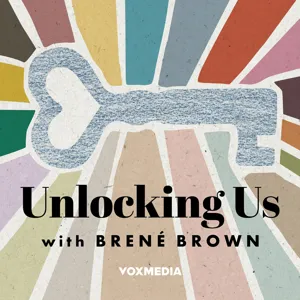Podcast Summary
Celebrating culture and self-care during challenging times: Celebrate culture, find joy, prioritize self-care, recognize exhaustion, and normalize emotions during crises. Apple Card offers rewards for daily cash back and high savings yield.
It's important to acknowledge and normalize the collective exhaustion we're experiencing during these challenging times, while also recognizing the value of normalcy and the importance of addressing the mess, loneliness, and overwhelm that can follow the crisis. Johanna Ferreira, content director of PopSugar Juntos, encourages us to celebrate latinate culture and find joy in the things we love, which can be found on Prime. Meanwhile, Brené Brown reminds us of the importance of recognizing and normalizing the exhaustion we're experiencing, while also acknowledging the importance of normalcy and addressing the emotional aftermath of crises. Whether it's through culture, community, or personal growth, it's essential to prioritize self-care and support during these times. And for those looking to earn rewards while doing so, Apple Card offers daily cash back and a high annual percentage yield on savings.
Settling the ball and creating a new normal: Focus on creating strategies for the long-term during the COVID-19 crisis, limit news intake, practice gratitude, and adapt to changing relationships through a family gap plan.
We are in the midst of a prolonged crisis, and it's important to shift our mindset from crisis mode to a longer-term perspective. This means settling the ball and creating a new normal while grieving the loss of the old one. We cannot keep kicking the ball at shoulder height with infinite energy. Instead, we need to focus, breathe, and develop strategies with solid information. Limit your news intake and screen time, and find reliable sources of science and epidemiology to gather information from. Strong relationships are not always 50-50, and the first strategy for settling the ball is creating a family gap plan. This involves recognizing that relationships require effort and adaptation, and that everyone's needs and contributions will not always be equal. Another strategy is to practice gratitude and focus on the positive. This can help us cope with the challenges of the crisis and maintain our mental and emotional well-being. By settling the ball and developing strategies, we can navigate the marathon that is the COVID-19 pandemic and come out the other side stronger and more resilient.
Maintaining relationships during low energy times: Effective communication and understanding of each other's energy levels is crucial for maintaining a healthy and lasting relationship, especially during times of need.
Strong relationships require each partner to step up and support one another during times of need, even when energy levels are low. This concept was illustrated through a personal story where one partner, while the other was traveling and exhausted, expected the other to provide energy and support upon return. However, they both found themselves at low energy levels, leading to frustrating interactions. It was only when they acknowledged their collective "family unit" and the need for a 100% contribution that they were able to develop a "family gap plan" to address these situations. By openly communicating and understanding each other's energy levels, they were able to bridge the gap and support each other more effectively. This communication and understanding is crucial for maintaining a healthy and lasting relationship.
Prioritize self-care and communication during family crises: Get enough sleep, move body, eat well, avoid harsh words, offer real apologies, and establish a family gap plan for stronger relationships.
During times of crisis or when the family is not at its best, it's important to prioritize self-care and communication. This includes getting enough sleep, moving the body, eating well, and avoiding harsh words or nice words with harsh faces. Real apologies and acceptance of apologies are also crucial for maintaining healthy family relationships. The family gap plan, a proactive approach to addressing challenges, can be established from a young age. These practices can help families navigate difficult times and build stronger, more resilient relationships.
Effective communication and understanding are key to resolving family conflicts: Sincere apologies, acknowledging emotions, and mindful communication foster empathy, compassion, and stronger family connections
Effective communication and understanding are crucial in resolving conflicts and bridging gaps within families. Apologies, expressed with sincerity and accepted with gratitude, play a significant role in healing. However, it's essential not to downplay the importance of apologies by dismissing them with phrases like "it's okay." Comparison and scarcity, driven by fear, can lead to unnecessary suffering and hinder emotional growth. Instead, focusing on our individual experiences and acknowledging the validity of others' emotions can foster empathy and compassion. By practicing mindful communication and embracing vulnerability, families can build stronger connections and create meaningful experiences despite challenging circumstances.
The danger of suppressing emotions and the power of empathy: Suppressing emotions can be harmful, but practicing empathy increases empathy for self and others, combating shame and creating a more compassionate world
Denying or suppressing our emotions due to feelings of insufficient suffering can be dangerous. This belief stems from the myth that empathy is finite, leading us to believe that caring for ourselves leaves less empathy for others. However, the truth is that practicing empathy with ourselves and others actually increases empathy. Shame, an egocentric emotion, thrives on secrecy, silence, and judgment. On the other hand, empathy, an other-focused emotion, is the antidote to shame. When we practice empathy, our focus shifts outward, allowing us to understand and connect with others' experiences. By embracing our emotions and extending empathy to ourselves, we create a more compassionate world, benefiting both ourselves and those around us.
Practice empathy towards ourselves and others: Focus on empathy during challenging times, acknowledge emotions, support each other, and model healthy coping mechanisms for kids.
It's essential to practice empathy towards ourselves and others, even during challenging times, without ranking suffering. We all have the capacity to offer empathy and process information about others, but it becomes difficult when we focus on our own struggles and compare them to others. Perspective is crucial, and it's okay to complain and feel hard emotions. However, we should remember that every emotion, including hurt, affects us all. Kids, in particular, need our support and permission to feel their emotions while we model healthy ways of dealing with ours. As we navigate collective weariness, it's important to come up with a family gap plan, acknowledge where we are, and support each other instead of comparing our struggles. Let's focus on attending to our emotions and putting more empathy in the world.





